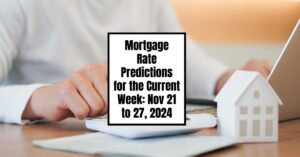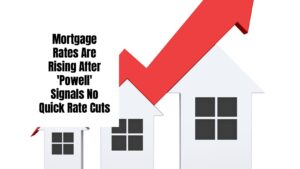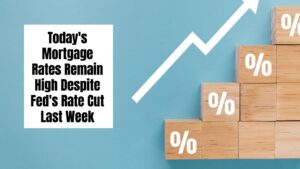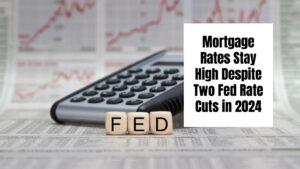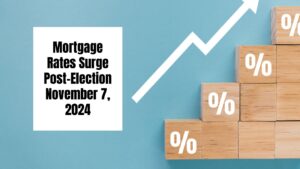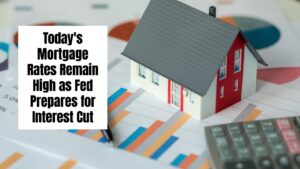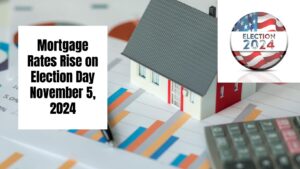If you're in the market for a home or considering refinancing your existing mortgage, understanding the mortgage rate trends and predictions for the current week is crucial. As of November 20, 2024, the average rate for a 30-year fixed mortgage is 7.02%, with experts predicting a mix of stability and slight changes over the coming week.
Weekly Mortgage Rate Trends and Predictions: November 21-27, 2024
Key Takeaways
- Current Average Rate: 7.02% for a 30-year fixed mortgage.
- Predictions:
- 50% Expect No Change.
- 33% Project a Decline.
- 17% Anticipate an Increase.
- Market Sentiment: Influenced by the upcoming holiday, with limited economic reports expected to impact rates.
Buying a house and getting a mortgage can be really confusing, especially when the economy feels shaky. As Thanksgiving gets closer, a lot of people are worried about how that might change mortgage interest rates in the coming week, from November 21st to 27th, 2024. Paying attention to what's happening with mortgage rates can give you a better idea of how they might change, which can help you make smart choices about your money in the future.
Current Rates and Trends
As of November 20, 2024, the average 30-year fixed-rate mortgage is at 7.02%. This shows a slight increase from 7.00% in the previous week, according to a comprehensive survey by Bankrate. Meanwhile, Freddie Mac reports a lower rate of 6.84% for the same week. Understanding these numbers is vital, as they influence monthly payments and overall borrowing costs for prospective homebuyers.
Expert Mortgage Rate Predictions for the Week Ahead
According to Bankrate's expert poll, the predictions for mortgage rates over the next week are as follows:
- 50% of experts believe that rates will stay the same.
- 33% anticipate rates will decline slightly.
- 17% predict rates will rise.
This mixed sentiment indicates a potential for stability, even amid inflation concerns and shifts in economic data. This is reassuring information for homebuyers, suggesting that there might not be significant movements in mortgage rates during this holiday period.
Recommended Read:
Key Influences on Mortgage Rates
Economic Conditions
Several factors contribute to the predictions regarding mortgage rates. With the holiday season approaching, many experts believe that a slowdown in economic data can lead to flat rates. Michael Becker from Sierra Pacific Mortgage highlighted that there are few major economic reports set for release before Thanksgiving, suggesting a lack of significant market movement. This reduced trading activity typically stabilizes rates.
Conversely, inflation remains a pressing issue influencing rates. Sean P. Salter, Ph.D., points out the rising 10-year Treasury yields driven by concerns about future inflation. If inflation continues to surprise on the upside, mortgage rates may need to adjust upward to reflect increased risk for lenders. This type of dynamic shows how interconnected the housing and broader economic markets are.
Sentiment Around Inflation
Rated perspectives on inflation continue to vary among experts. Dan Green, CEO of Homebuyer.com, remains optimistic about lower rates, noting improvements in inflation metrics and a stronger U.S. dollar. Furthermore, Ken Johnson from the University of Mississippi mentioned that as yields on 10-year Treasurys have dropped, there is potential for mortgage rates to follow suit, easing borrowing costs slightly.
Short-Term Outlook
As we approach the Thanksgiving holiday, various experts predict that the interplay of limited economic announcements—combined with seasonal trading patterns—will prevent dramatic shifts in mortgage rates. As previously mentioned, 50% of industry professionals anticipate stability in rates, reflecting confidence among lenders and borrowers alike.
Nonetheless, it's crucial to acknowledge that day-to-day volatility may still occur. Jonathan Smoke from Realtor.com emphasizes the unpredictable nature of financial markets, further suggesting that investors might react variably based on geopolitical or domestic economic changes.
Frequently Asked Questions (FAQs)
1. What is the current mortgage rate for a 30-year loan?
As of November 20, 2024, the average rate for a 30-year fixed mortgage is 7.02%, but Freddie Mac reports a slightly lower average of 6.84% for the same period.
2. Will mortgage rates go down in the upcoming week?
While 33% of experts believe that rates will decline slightly over the week of November 21 to 27, the majority (50%) expect rates to remain unchanged due to the holiday season and reduced market activity.
3. What factors influence mortgage rate fluctuations?
Mortgage rates are influenced by various factors, including economic indicators such as inflation, employment reports, and changes in the 10-year Treasury yield, which reflects investor sentiment about future economic conditions.
4. How do holidays affect mortgage rates?
During the holiday season, market activity often slows down due to reduced trading and fewer economic reports being released, which can lead to more stable rates without significant fluctuations.
5. Should I lock in a mortgage rate now?
If you’re considering a mortgage, it may be wise to lock in a rate, especially if you anticipate that rates could increase in the future amid ongoing economic concerns.
Conclusion
Basically, mortgage rates this week (November 21st to 27th) seem like they might stay about the same, but we should still be careful. The average rate for a 30-year mortgage is around 7.02% right now. If you're thinking about buying a home, it's important to pay attention to what's happening with mortgage rates.
Related Articles:
- Half of Recent Home Buyers Got Mortgage Rates Below 5%
- Mortgage Rates Need to Drop by 2% Before Buying Spree Begins
- Mortgage Rates Predictions for the Next Three Months Q4 2024
- Prediction: Why Mortgage Rates Won’t Go Below 6% in 2024?
- Will Mortgage Rates Ever Be 3% Again: Future Outlook
- Mortgage Rates Predictions for Next 2 Years
- Mortgage Rate Predictions for Next 5 Years
- Mortgage Rate Predictions for 2025: Expert Forecast
- Prediction: Interest Rates Falling Below 6% Will Explode the Housing Market
- Mortgage Rate Predictions: Why 2% and 3% Rates are Out of Reach
- How Lower Mortgage Rates Can Save You Thousands?
- How to Get a Low Mortgage Interest Rate?
- Will Mortgage Rates Ever Be 4% Again?
